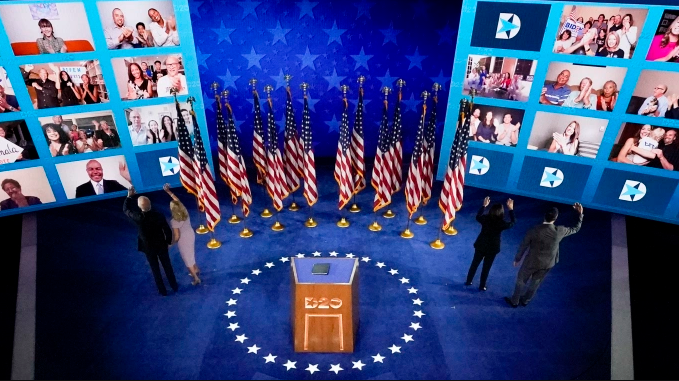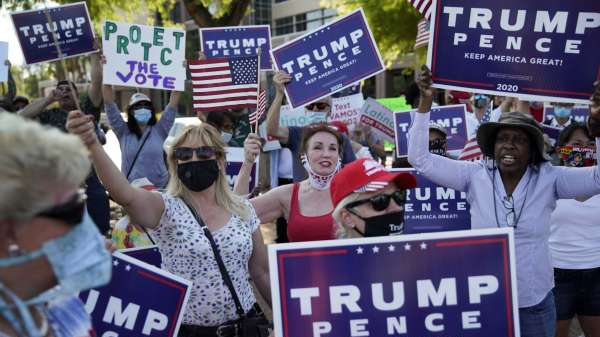
Democratic presidential candidate and former U.S. Vice President Joe Biden (L), his wife Jill Biden (2nd L), Democratic vice presidential candidate Senator Kamala Harris (2nd R) and her husband Doug Emhoff wave to supporters after Biden spoke during the fourth day of the Democratic National Convention, at the Chase Center in Wilmington, Delaware, the U.S., August 20, 2020. /AP
Democratic presidential candidate and former U.S. Vice President Joe Biden (L), his wife Jill Biden (2nd L), Democratic vice presidential candidate Senator Kamala Harris (2nd R) and her husband Doug Emhoff wave to supporters after Biden spoke during the fourth day of the Democratic National Convention, at the Chase Center in Wilmington, Delaware, the U.S., August 20, 2020. /AP
Editor's note: Freddie Reidy is a freelance writer based in London. He studied history and history of art at the University of Kent, Canterbury, specializing in Russian history and international politics. The article reflects the author's opinions, and not necessarily the views of CGTN.
As the Democratic Party concluded their national convention and the Republican Party enters their own, you could, as a moderate American voter, feel somewhat abandoned. The election has been described by President Trump as "a fight for the survival of our nation and civilization itself." Simultaneously Michelle Obama demanded that Americans vote for Joe Biden "as if their lives depended on it." With such extreme rhetoric, what prospects are there that either candidate can appeal to a moderate voter?
Some political commentators interpreted Joe Biden's speech at the virtual Democratic National Convention akin to the "return to normalcy" address of Warren G. Harding, reassuring a nation after the First World War, or in this case, the presidency of Donald Trump. This type of analysis is indicative of the challenge which the Biden camp faces.
The "return to normalcy" speech of 1920 resonated due to the collective suffering the nation had endured through war and the subsequent influenza pandemic. However, even by conservative estimates, this is not a view which 42.3 percent of the nation shares, according to the latest RealClearPolitics national average.
There is a pervasive lack of understanding from the Democratic leadership and their most vocal supporters, as to why Trump won the last election and retains significant support. Biden's speech referred to "choosing the path of light" implying that those who supported or are considering supporting Trump are choosing a path of darkness. Declaring "I'll be ally of light not darkness…We'll choose hope over fear."
In a binary political system, associating half of the nation, many of whom may be sitting on the fence, with forces of darkness, seems a somewhat desperate and questionable line of attack, somewhat reminiscent of Hillary Clinton's notorious "basket of deplorables" gaffe.
To the moderate voter, there was some hope. The former vice president did declare this to be "not a partisan moment" but rather "an American moment". While going on to promise that as president he would "work as hard for those who didn't support me, as for those who did."

People chant during a protest in Las Vegas, Nevada, against a law to mail ballots to all of the state's active voters ahead of the November election, on August 4, 2020. /AP
People chant during a protest in Las Vegas, Nevada, against a law to mail ballots to all of the state's active voters ahead of the November election, on August 4, 2020. /AP
The coming weeks will be a test of Biden's grip on his campaign narrative. Declarations of unity are closer aligned with his natural, centrist footing. However, he is also having to throw a bone to those who in his party who are desperate to rid the country of the incumbent president and all he stands for.
There are many in Democratic circles who are uncertain of Biden's candidacy and who were dismayed by the appointment of Kamala Harris, seen as another centrist politician. Many of these critics are former Bernie Sanders supporters, the same voters who never fully endorsed Hillary Clinton in 2016, contributing to Trump's eventual victory.
The hard-left of the Democratic party may be appeased this time as they continue to pursue an "anything but Trump" campaign, but if the likes of Alexandria Ocasio-Cortez gain a prominent voice, then this could seriously hinder the prospect of winning over key swing voters in essential battlegrounds such as Florida, Minnesota, Pennsylvania and Wisconsin.
The same risk also comes from a reliance on celebrity endorsements, the Democratic convention featured roasts by comedians such as Sarah Cooper and actress Julia Louis Dreyfus. While a highly successful actress, Louis Dreyfus is heir to the Louis Dreyfus shipping empire and worth in excess of 250 million U.S. dollars in her own right; the epitome of a liberal elite and easy target for a Trump attack.
Looking to the Republican convention, we can see a similar concession to powerful factions within the Republican movement. Prominent among these, is the NRA. Andrew Pollack is due to speak on how he believes his daughter would have survived the Parkland School massacre had teachers been able to carry firearms. Feeding a narrative that the incumbent president is a guardian of American rights as enshrined in the constitution.
While America struggles with COVID-19, the election may well become a watershed moment where America is given an opportunity to vote on the country it wishes to become as it emerges from the ashes of pandemic.
Joe Biden stated that "character is on the line in November" and this is the more likely outcome. Biden's speech was the shortest convention speech ever since 1984 and was thin on policy, beyond being not resembling the status quo. We can therefore expect a "survival of the fittest" contest aimed at mobilizing base movements.
For Biden, this means non-white voters turning out in the same way as they did for him and Barack Obama in 2008 and for President Trump, it means retaining the faith of blue collar voters and conservatives discontented with what they perceive as the erosion of American values and status.
There are unlikely to be too many surprises from the Trump camp. For Biden, with everything to lose, preaching to the converted will likely prove too great a lure for the Democratic leadership. However, if Biden and Harris feel emboldened by the polls, they may just feel confident enough to stake a claim for the middle ground and secure the vital support of the moderate voter.
(If you want to contribute and have specific expertise, please contact us at opinions@cgtn.com.)